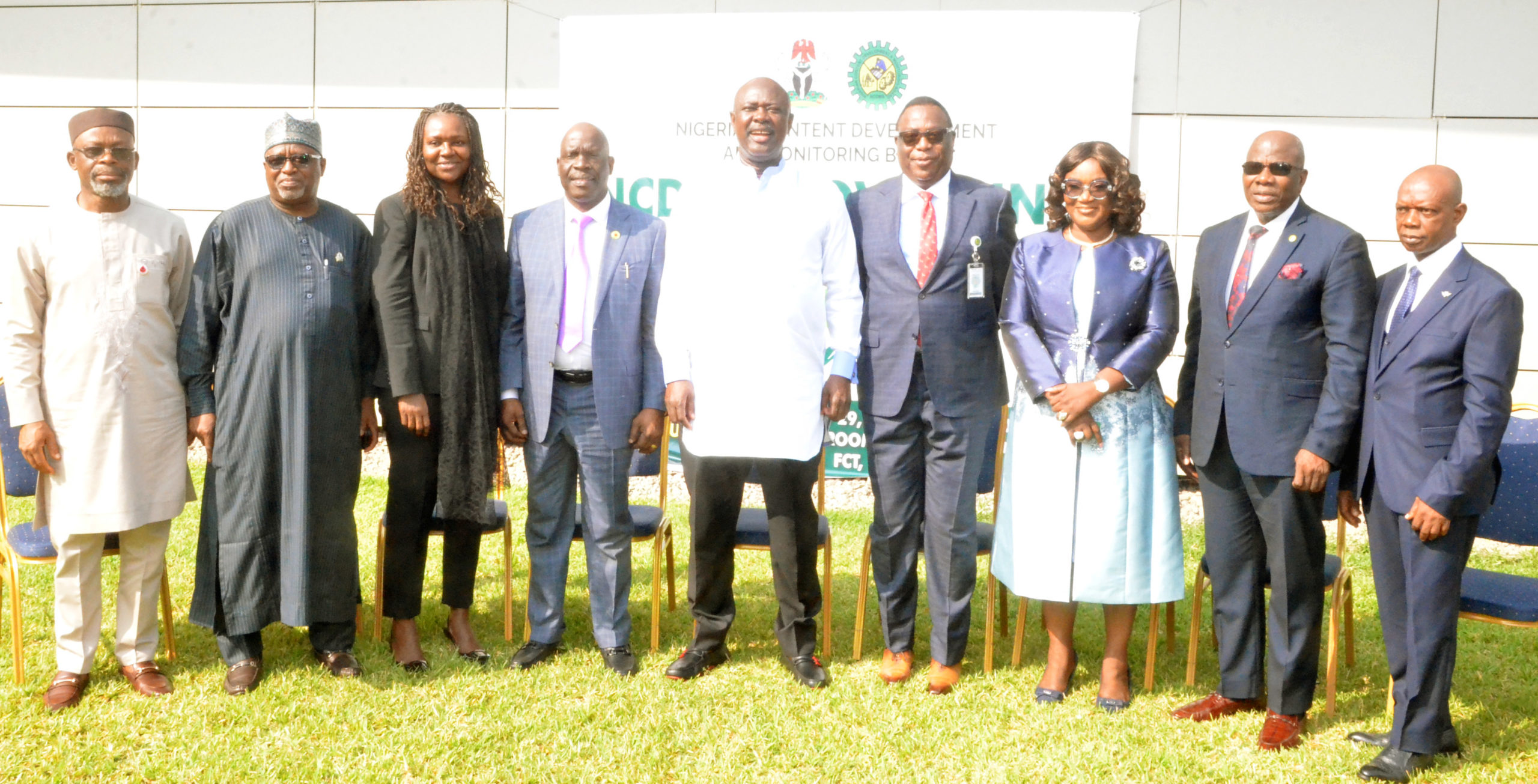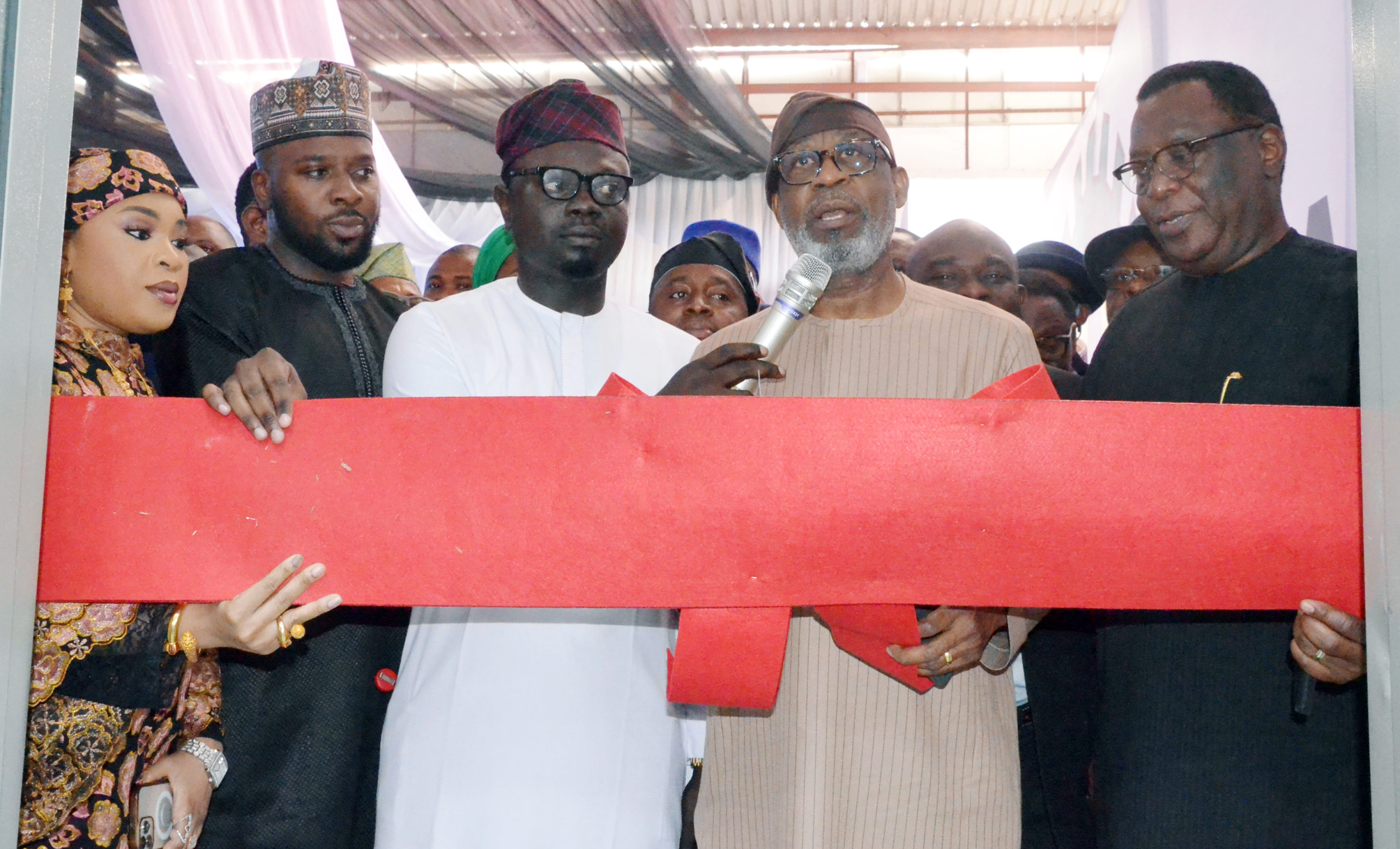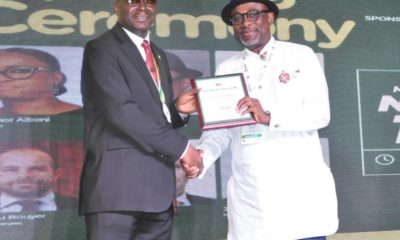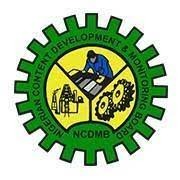Business
NCDMB Charges Indigenous Companies On Compliance

Mid-way into a 10-year Strategic Road Map for enhanced indigenous participation and utilisation of local assets in oil and gas operations, industry regulator Nigerian Content Development and Monitoring Board (NCDMB) has recorded a 54 per cent Nigerian content level in 2022.
Presenting a status report at the 11th Practical Nigerian Content Workshop organised by the Board and DMG Nigeria Events at Uyo, Akwa Ibom State, the Executive Secretary NCDMB, Engr Simbi Kesiye Wabote explained that the average of Nigerian Content performance in the last five years is 44 percent, which represents the 10-year period the Nigerian Content Strategic Roadmap has been implementing so far.
He indicated that the performance in 2022 is well above the 42 percentage target set by the Project Management Office (PMO), just like in 2021 when 42 percent was achieved, above the target of 38 percent.
He confirmed that the tracking of the performance is based on the Board’s monitoring and evaluation of Industry activities.
Strikingly, the technical capability development pillar of the Road Map stands out as a major highlight as fabrication and construction, hitherto under near-total dominance by foreign firms, had 99 per cent Nigerian content during the period under review.
He further disclosed that 77 out of 96 initiatives under the short- and medium-term categories of the Road Map had been completed in November 2022.
He stated that manpower in the oil and gas industry had reached 81 per cent Nigerian content as of November, while project management as of that month was 80 per cent.
Zeroing in on year 2022, the Executive Secretary revealed that “performance was largely driven by the contracts awarded under the [Nigerian Liquefied Natural Gas] Train 7 Project.” Low points in accomplishment were in procurement, engineering and services, with Nigerian Content as unimpressive as 34, 46, and 50 per cent respectively. These, he assured, would be sufficiently addressed.
Technical data, cited by Engr. Wabote showed the capture of 12 new indigenous operators in the upstream sector of the oil and gas industry, bringing the total to 97. In the service subsector, there were 1,303 new corporate entrants, raising the total to 9,532, while 22,512 individual registrations were recorded, bringing the total to more than 271,000.
The Executive Secretary informed stakeholders that the Board has commenced the process of “allocation of serviced plots to manufacturers [of equipment components, spares, and tools required in petroleum industry operations] to kick start operations within our NOGAPS [Nigerian Oil and Gas Parks] industrial parks at Emeyal 1, Bayelsa State, and Odukpani in Cross River State,” assuring that “Construction work is also ongoing at the other NOGAPS parks in Akwa Ibom, Imo, Delta and Ondo States with Edo as the newest addition to the list.”
Engr. Wabote expressed the Board’s displeasure at the activities of indigenous oil and gas companies, which seek to undermine its effectiveness after they had benefitted from strategic interventions in funding and capacity building programmes of the organisation. He advised them to turn a new leaf and ensure compliance with regulations or face the consequences.
He commended the Group Managing Director of the Nigerian National Petroleum Company (NNPC) Limited, Malam Mele Kyari, who had to fly in from Rabat straight to the Conference in Uyo, for his commitment to NCDMB’s local content drive.
In his own remarks the NNPC boss assured the nation that the effort to deepen the utilisation of gas to drive industrialisation and economic development was very much on course. While emphasising Nigeria’s interest in gas as energy transition fuel, he stated that “Gas provides the opportunity to power the global economy.”
Among several projects embarked upon by Government, he cited the multibillion dollar Nigeria-Morocco Trans Saharan Gas Pipeline, which had taken him to Morocco recently. Feedstock for the pipeline, he explained, would be from faraway Brass in Bayelsa State. He further assured, “We will complete the OB-3 [East-West pipeline, with a projected capacity of two billion standard cubic feet] pipeline.”
In a welcome address, the Governor of Akwa Ibom State, Mr. Udom Emmanuel, expressed the joy of the people of the State for the opportunity to host the PNC for a second time. Represented by the Deputy Governor, Mr. Moses Ekpo, he stated the desire of the State to be considered in plans for oil and gas producing states.
The PNC Conference continues on Wednesday, with paper presentations and panel discussions on the general theme of deepening Nigerian content.
Business
ADF Flags Off N16Bn 2025 National Food Intervention Programme

Over one million Nigerians nationwide will receive a 10kg bag of rice each, with the Aliko Dangote Foundation (ADF) distributing the staple food as part of the 2025 Annual National Food Intervention Project.
The initiative, which commenced on Thursday would is estimated at a whooping cost of N16 billion.
During the flag-off of the nationwide distribution in Kano, Chairman of the Foundation, Alh Aliko Dangote, said the distribution of one million bags of 10kg rice to the poor and vulnerable Nigerians in the 774 Local Government Areas (LGA) in Nigeria was in line with the core values of his businesses and the ADF.
Dangote, who was represented by his daughter, Mariam Aliko Dangote said, “This annual initiative, which embodies compassion, solidarity, and shared responsibility, is part of our response to the current economic challenges facing our nation. It reflects our commitment to supporting our communities in line with our core values.”
ALSO READ: BREAKING: Rivers Chief Judge Under Probe For Alleged Age Falsification
He highlighted that the Foundation was kicking off the distribution in Kano State, after which it will proceed to other states, assuring that all arrangements are in place to ensure the food reaches those who need it most in all the LGAs of Nigeria.
Dangote, reputed to be Africa’s wealthiest person opined that food remains a basic human necessity, and this is why the ADF adopted the practice of embarking on a food distribution programme across Nigeria.
“We are collaborating with state governments to ensure that the food reaches the most vulnerable individuals in each state,” he added.
According to Dangote the ADF focuses on improving the living conditions of Nigerians through support for projects which tackle hunger and water supply problems, strengthen the quality and scope of health and education, and promote economic empowerment at the community level.
“Your excellency, I believe that today’s event will help in tackling hunger and helping the most vulnerable people in breaking their fast. We are playing our role in enhancing the living conditions of our people. I urge other industrialists and firms to lend a helping hand in combating hunger through programmes and initiatives that will place food on the tables of vulnerable Nigerians. This job should not be left to the government alone, rather we need a public private partnership that will help us in fighting the scourge.
“I commend the government at all levels for their efforts at addressing the food crisis. I am certain that with time, we shall overcome these challenges, therefore let us support the government to achieve its target of a better life for Nigerians, “he said.
On his part, Kano State Governor, Abba K. Yusuf, who flagged off the National Food Intervention Programme commended the good gesture and said the intervention reflects the unwavering commitment of Alh Dangote in addressing poverty and hunger in Nigeria.
The Governor, who was represented by his Deputy, Comrade Aminu Abdulsalam Gworzo said 120,000 bags of 10kg rice will be distributed across the 44 Local Government Areas of the state.
He described Alh Dangote as humane, adding that: “A similar event took place last year where he personally oversaw the distribution of food stuff to the poor in this very arena.”
To ensure transparency in the distribution process, he said the state government has set up a committee comprising of relevant ministries, CSOs, religious leaders, departments and agencies, local authorities, the Hisbah Board and security agencies.
Managing Director and Chief Executive Officer of the Aliko Dangote Foundation, Zouera Youssoufou, said the Annual National Food Intervention Project is a way of giving back, and supporting governments in fighting poverty and hunger in Nigeria.
She said that Alh Dangote is passionate about philanthropy and committed to ensuring that hunger is wiped out or reduced to the minimum in Nigeria.
“We are going to other states to distribute the products, but we’ve just flagged off in Kano,” she told newsmen on the sideline of the Kano Government House, venue of the flag off.
The Deputy Commander-General of Hisbah Board in Kano, Dr. Mujahid Aminudeen, thanked the ADF for the initiative, urging more Nigerians to emulate Alh Dangote in the humanitarian cause.
He said the Hisbah Board will ensure that the products reach the targeted beneficiaries.
One of the beneficiaries, Ibrahim Ahmed, speaking on behalf of others thanked Alh Dangote for his large heart saying the gift would go a long way in reducing food pressures on them especially during the Ramadan while also praying God to continue to help him in his businesses.
Recall that the ADF has been at the forefront of tackling and ameliorating the impact of natural disasters and health challenges in Nigeria and the rest of the world.
The ADF donated N153million to boost Nigeria’s fight against Ebola Virus Disease in 2014, $3million to the African Union (AU) to help combat the scourge, and N66.66 million to install thermal scanning systems and cameras at Nigeria’s 4 international airports.
During the COVID-19 pandemic, we donated N2billion to the CACOVID Fund, a Private Sector task force in partnership with the Federal Government, the Nigeria Centre for Disease Control (NCDC) and the World Health Organisation (WHO) with the sole aim of combating Coronavirus (COVID-19) in Nigeria.
In support for education, we donated a N1.2bn modern business school edifice to the Bayero University, Kano, a fully equipped 2,160-bed capacity hostel complex to the Ahmadu Bello University, Zaria and a N300 million building to University of Ibadan Business School.
Beyond the shores of Nigeria, the ADF has also recorded milestones with a donation of $1million, to lift victims of two earthquakes that devastated Nepal.
Business
Lawmakers Call For Immediate Reversal Of ATM Fee Increase

The Central Bank of Nigeria (CBN) is under pressure to suspend its recently introduced increase in Automated Teller Machine (ATM) transaction charges due to the country’s worsening economic conditions.
During Tuesday’s plenary session, Marcus Onobun, a lawmaker representing Esan Central/Esan West/Igueben Federal Constituency in Edo State, raised concerns over the policy through a motion of urgent public importance.
He noted that the CBN’s directive not only increases withdrawal fees but also removes free ATM transactions for customers using other banks’ machines, adding to the financial strain on Nigerians.
SEE ALSO: Direct CBN To Suspend ATM Fee Hike Pending Court Verdict, SERAP Tells Tinubu
According to the new regulations, customers withdrawing from their own bank’s ATMs will still enjoy free withdrawals.
However, those using other banks’ ATMs will now be charged N100 for withdrawals of N20,000 within a bank’s premises. At off-site ATMs, such as those in shopping malls or markets, the charge remains N100, but with an added N500 surcharge.
Onobun, a member of the Peoples Democratic Party (PDP), argued that Nigerians are already struggling with economic difficulties, including high inflation, rising fuel costs, increased electricity tariffs, and multiple banking fees.
He warned that the additional charges could further discourage financial inclusion, particularly among low-income earners, contradicting the CBN’s own agenda.
“The banking sector continues to record significant profits, yet customers are being burdened with more charges without any improvement in service delivery or infrastructure. This is unfair and unacceptable,” he stated.
Following his motion, Speaker Tajudeen Abbas put the matter to a voice vote, and lawmakers overwhelmingly supported it.
As a result, the House of Representatives called on the CBN to immediately halt the implementation of the policy until further consultations are held with relevant banking and finance committees.
Business
NNPC Ltd Clarifies Naira-Crude Contract With Dangote Refinery

The Nigerian National Petroleum Company Limited (NNPC Ltd) is already emplacing an new naira for crude contract with the Dangote Petroleum Refinery and Petrochemicals, because the initial contract was for six months which expired in March 2025.
This clarification was made in a statement in Abuja by the Chief Corporate Communications Officer, NNPC Ltd, Olufemi Soneye on Monday.
ALSO READ: Naira-For-Crude Policy Still-In-Force – Chairman, Technical Sub-Committee
According to Soneye, the NNPC Limited has noted recent reports circulating on social media regarding the alleged unilateral termination of the crude oil sales agreement in Naira between NNPC Ltd. and Dangote Refinery.
To clarify, the contract for the sale of crude oil in Naira was structured as a six-month agreement, subject to availability, and expires at the end of March 2025. Discussions are currently ongoing towards emplacing a new contract.
Under this arrangement, NNPC Ltd. has made over 48 million barrels of crude oil available to Dangote Refinery since October 2024. In aggregate, NNPC Ltd. has made over 84 million barrels of crude oil available to the Refinery since its commencement of operations in 2023.
NNPC Limited remains committed to supplying crude oil for local refining based on mutually agreed terms and conditions.























